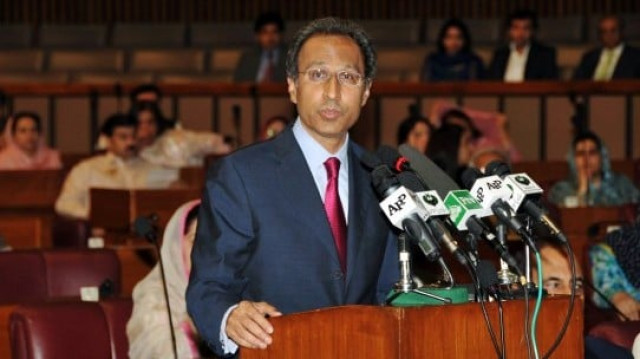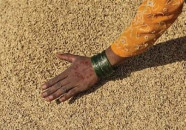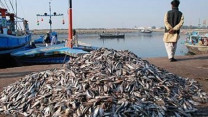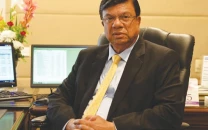Govt seeks nod for Rs170b supplementary budget
This will take total excess expenditure above approved budget to Rs392b in FY19

Finance minister Hafeez Shaikh is presenting the budget. PHOTO: AFP/FILE
The Ministry of Finance could not properly estimate the over-spending in the first year of the Pakistan Tehreek-e-Insaf (PTI) government (fiscal year 2018-19) and secured ex-post facto approval of parliament for Rs222 billion worth of additional spending at the time of budget 2019-20. On Monday, the finance ministry presented a summary to the Economic Coordination Committee (ECC) of the cabinet for the approval of additional spending of Rs170.4 billion incurred in fiscal year 2018-19, which ended on June 30.
The Rs170.4-billion additional spending took place between May 22 and June 30 of the previous fiscal year. Adviser to Prime Minister on Finance and Revenue Dr Abdul Hafeez Shaikh chaired the ECC meeting.
The ECC approved a proposal of the Finance Division for the submission of a supplementary budget statement (addendum) amounting to Rs170.418 billion from the federal consolidated fund for financial year 2018-19 to the National Assembly under Article 84(a) of the Constitution, according to a statement issued by the ministry after the meeting.
With the fresh approval, the total excess spending in the previous fiscal year reached Rs392.5 billion, which was nearly 44% higher than initially disclosed by the Ministry of Finance at the time of the budget. The excess spending belies the claim of enforcing austerity.
However, the Rs392.5-billion spending was 34% less than the Rs599-billion supplementary budget in the last year of PML-N government. The government on Monday approved increase in discretionary spending under parliamentarians’ schemes by 16.7% to Rs28 billion for the current fiscal year. The National Assembly had approved Rs24 billion for spending on the schemes recommended by members of the National Assembly and Senate.
The ECC approved a technical supplementary grant of Rs4.05 billion lapsed in financial year 2018-19 under the Sustainable Development Goals Achievement Programme (SAP), stated the Ministry of Finance. The re-allocated funds would be used under the SAP to make specific interventions as per demand of the community across the country in line with the UN Conventions.
The ECC also granted ex-post facto approval to a proposal of the Ministry of Interior, seeking technical supplementary grant of Rs100 million on making security arrangements in the federal capital in October 2019.
However, the ECC expressed its concern at the manner in which ad hoc arrangements were made, which were costly and disruptive for the business sector and for the perception of the country, and asked the capital administration to find a permanent solution to deal with the issue in future.
The expenses of Rs100 million were incurred while maintaining law and order during a sit-in led by Jamiat Ulema-e-Islam’s Maulana Fazlur Rehman.
The ECC approved a proposal of the Ministry of Industries and Production for the utilisation of subsidy as approved by the cabinet in pursuance of the prime minister’s directive dated November 8, 2019 involving grant of Rs6 billion to the Utility Stores Corporation (USC) for subsidy and procurement of essential commodities, including flour, sugar, ghee/oil, pulses and rice.
The ECC also constituted a committee, headed by Adviser to Prime Minister on Commerce Abdul Razak Dawood, to monitor the disbursement of subsidy and provision of commodities at fair prices to the poor segment of society through a transparent and effective mechanism. The committee would report to the ECC in its next meeting.
It approved the proposal with instructions that such proposals involving transfer of money from external sources should be taken up by the Ministry of Finance instead of the ECC and the release of money be ensured in a smooth manner.
The ECC took up a proposal of the Ministry of National Food Security and Research for exemption from 5% sales tax on cottonseed cake. After a detailed discussion, it referred the matter to the Finance Division for examination and reporting back to the ECC in its next meeting. The chances for approval of the tax exemption remain low as the IMF has placed a new condition on Pakistan, barring it from giving preferential tax treatment to any sector.
Published in The Express Tribune, December 24th, 2019.
Like Business on Facebook, follow @TribuneBiz on Twitter to stay informed and join in the conversation.



















COMMENTS
Comments are moderated and generally will be posted if they are on-topic and not abusive.
For more information, please see our Comments FAQ